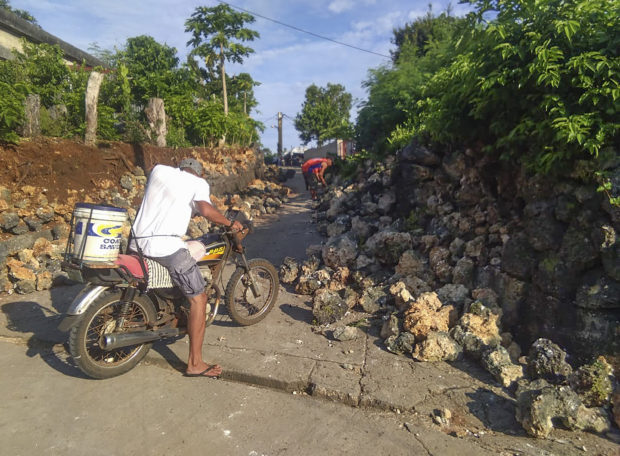
A resident looks at the damage in Itbayat town in Batanes following the earthquakes Saturday, July 27, 2019. (Photo by AGNES SALENGUA NICO via AP)
Updated @ 9:16 p.m., July 27, 2019
BASCO, Batanes, Philippines – Six of the nine Itbayat town residents killed during the Saturday (July 27) earthquake that struck at dawn were buried at the cemetery in the afternoon due to insufficient embalming materials there.
The Itbayat hospital, which was damaged, has no facilities to store the dead, some of the families of the dead agreed to proceed with a mass funeral at about 5 p.m., according to Josefa Ponce, secretary of the Itbayat Municipal Council.
Genward Mina, who was crushed by a boulder while protecting his girlfriend, was laid to rest.
Also buried were Fiona Valiente, a 10-day-old baby; Tito Asa, 88; Teresita Gulaga, 76; Eva Valiente, 19; and Edwin Ponce, 32, who was initially reported to be missing.
READ: 1 remains missing after Batanes twin quakes—Itbayat vice mayor
Earlier, it was reported that all nine fatalities were buried, but three fatalities were not buried — 73-year-old Fausta Caan; her granddaughter, 5-day-old baby Haisly Cheffe Naquita; and 13-year old Mary Rose Valiente.
Their relatives had not allowed their burial as of this writing.
Valiente’s mother is at the Basco hospital where her other child is being treated as of this writing.
Most Itbayat residents have opted to stay in tents outside their houses, fearing aftershocks, some of which were stronger than the 5.4 tremor that rocked the town at 4:16 a.m.
Just hours apart
Two strong earthquakes struck just hours apart, killing at least nine people, injuring about 60 and damaging ancestral houses famous among tourists.
The quakes collapsed homes of stone and wood and roused residents from sleep, said Roldan Esdicul, who heads the Batanes provincial disaster-response office. Footage showed people clearing boulder-size stone bricks to pull out one body from the rubble.
“Our bed and everything were swaying from side to side like a hammock,” Esdicul told The Associated Press by cellphone from Basco town, the provincial capital. “We all ran out to safety.”
On hard-hit Itbayat island, school teacher Agnes Salengua-Nico said she and her husband woke up horrified with the ground shaking and a cabinet crashing to the floor. Their house withstood the shaking but others in the neighborhood crumbled, pinning residents inside, she said.
“We’re out now in the farm with our three pigs because we’re very, very scared of the aftershocks,” she told AP by phone, her voice trembling shortly after the ground shook again.
More than 2,000 residents of Itbayat — nearly all of the island’s population of mostly fishermen — were advised not to return to their homes and stay in the town plaza as successive aftershocks shook the region, Esdicul said.
Army troops and additional doctors later flew in after Itbayat’s airport runway was declared safe.
The quakes measured 5.4 and 5.9 at relatively shallow depths, the Philippine Institute of Volcanology and Seismology said.
A third quake with a magnitude of 5.8 struck at sea west of Batanes later Saturday, it said.
‘Can’t stand or walk’
Esdicul said he was already in his office with the provincial governor when the second and more powerful quake struck about three hours after the first shock.
“We have to hold on because you can’t stand or walk. It was that strong,” he said.
The initial quake severely cracked the bell tower of the island’s old limestone church, the 19th-century Santa Maria de Mayan, a popular tourist attraction. The tower crumbled down when the second temblor hit the island, he said.
A one-story hospital was damaged, prompting patients to be evacuated and brought out in the open with dozens of injured quake victims. Some were later crammed into a basketball court with a roof due to heavy rains, Esdicul said.
Seven of those injured who sustained serious fractures were airlifted out of Itbayat to a bigger provincial hospital, he said.
Itbayat, part of the country’s northernmost Batanes Islands, has a population of about 2,800 people and lies in the Luzon Strait that separates the Philippines and Taiwan. The islands are famous for their tiny ancestral stone houses with coral walls and cogon grass roofs and are often lashed by seasonal typhoons.
As Metro Manila was having quake drill
As the quake jolted Batanes, thousands of residents were holding a pre-dawn earthquake drill about 250 kilometers (155 miles) to the south in Metro Manila, which was not affected by the quake.
Some journalists asked why the drills needed to be held so early in the morning, said Renato Solidum, a prominent seismologist and disaster-response expert who helped lead the drills.
When the earthquake hit Batanes shortly after, it helped officials underscore the fact that disaster can strike anytime, Solidum said.
One of the world’s most disaster-prone countries, the Philippines has frequent earthquakes and volcanic eruptions because it lies on the so-called Pacific “Ring of Fire,” a seismically active arc of volcanos and fault lines in the Pacific Basin.
A magnitude 7.7 quake killed nearly 2,000 people in Luzon in 1990.
/atm


